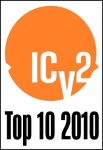
We list here our picks for the Top 10 Hobby Games Business Events of 2010, based on our assessment of their long term impacts.
1. Hobby game sales continue to grow in bad economy
Despite the worst economy in generations (or perhaps because of it), the hobby game market experienced a second straight year of growth, fueled by major brands that have stood the test of time and are growing again: Magic, Yu-Gi-Oh!, Settlers, HeroClix.
2. Upper Deck exits games (at least for a while)
After a bruising legal battle with Konami over Yu-Gi-Oh! and an expensive settlement, loss of the top three sports brands, and the ending of its relationship with Blizzard for the World of Warcraft brand, Upper Deck spent most of 2010 without releasing any games, a big change from its powerhouse status in recent years.
3. Cryptozoic gets World of Warcraft
New company Cryptozoic, including former Upper Deck, Blizzard, and Wildstorm execs, gets a license for World of Warcraft and begins producing WoW TCG releases, supporting them with organized play, and looking ahead to bigger things.
4. New deckbuilding category expands
Although the first major release in this category, Rio Grande’s Dominion, actually came out in 2008, 2010 was the year when deckbuilding games, which utilize the gameplay style of CCGs but eliminate the chase aspect of the purchasing experience, solidified as a new category.
5. WotC revamps Wizards Play Network
Wizards of the Coast refocused its organized play programs for Magic: The Gathering in 2010, eliminating most organized play not associated with stores, tying Premier Store status to organized play, ending the Magic Player Rewards Program, and cracking down on corrupt tournament organizers.
6. WotC launches RPG OP
Nobody’s ever figured out how to do it well or applied sufficient resources in the past, but in 2010 Wizards of the Coast launched the most extensive organized play program ever for a roleplaying game, Dungeons & Dragons Encounters, to good response. Combined with the re-launch of the D&D Red Box, WotC is taking its most aggressive run in years at reviving its oldest brand and what used to be the most important category in hobby stores.
7. Pathfinder ties D&D
For the first time in memory, a new roleplaying system is giving Dungeons & Dragons serious competition. Paizo’s Pathfinder RPG, based on 3.5 OGL rules, was launched in August of 2009 and by Q3 of 2010 was tied with D&D in hobby stores, according to the ICv2 survey (see “Top 5 RPGs—Q3 2010”).
8. New game retailers organization formed
A group of hobby game retailers formed the Professional Game Store Association this fall, creating a new organization focused solely on retailer concerns (as opposed to GAMA’s Retailer Division, an adjunct to the manufacturer’s association). One observer called this the Event of the Year (see “Rolling for Initiative—Event of the Year”); we're taking a wait and see approach.
9. Catalyst problems lead to Sandstorm
Catalyst Game Labs ran into problems in 2010 after one of the company’s owners co-mingled company with personal funds in an amount rumored to be $850,000. David Stansel-Garner, a former Catalyst employee, left the company and is now general manager of Sandstorm, a new company that handles CthulhuTech, formerly produced by Catalyst.
10. Gen Con attendance tops 30,000
After emerging from bankruptcy in 2009, some wondered how Gen Con would do in a continuing tough economy. Around 30,000 people attended GenCon in 2010 show, up substantially from the 28,000 that came in 2009.
For the Top 10 Hobby Games Business Events of 2009, click here.


